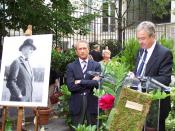In M. Butterfly the stereotypes created by Western world turn into the illusions about Asian world and its attributes. The brightest example of the creeping stereotypes created by the French in the play is Gallimard's perception of the Western politics towards Asian world. Gallimard's views are reflected in his discussions with Helga, Toulon, and, of course, Song.
"Orientals will always submit to a greater force." (46) This and other Gallimard's remarks fully express western believes that Asians should bow before the greater power because they can benefit from it. The French firmly believed that the traditional culture practiced by the Orientals should be replaced with something better and newer. "I walk around here, all I hear every day, everywhere is how old this culture is. The fact that "old" may be synonymous with "senile" doesn't occur to them"(18). Gallimard is confident that him and his colleagues have an absolute power to modernize this "old" and "outdated" culture and, as far as westerners are concerned, if they need to exercise the power to achieve the final goal, so be it.
Again and again throughout the play the stereotypes created by the French have proved themselves to be wrong. Gallimard's unrealistic perception of Asians resulted in his repatriation back to Paris, his humiliation and loss of his "happiness with Song." He could never imagine that the West would see resistance from the Orientals who "unlike a Western .... didn't confront [him], threaten, even pout." (56) It is interesting how in the conversation with Helga, Gallimard makes a comment: "The Chinese are an incredibly arrogant people." (18) At the same time, the arrogant people are in fact him and Toulon, and other French who have decided their presence is great for Asians. "They want the good things we can...


